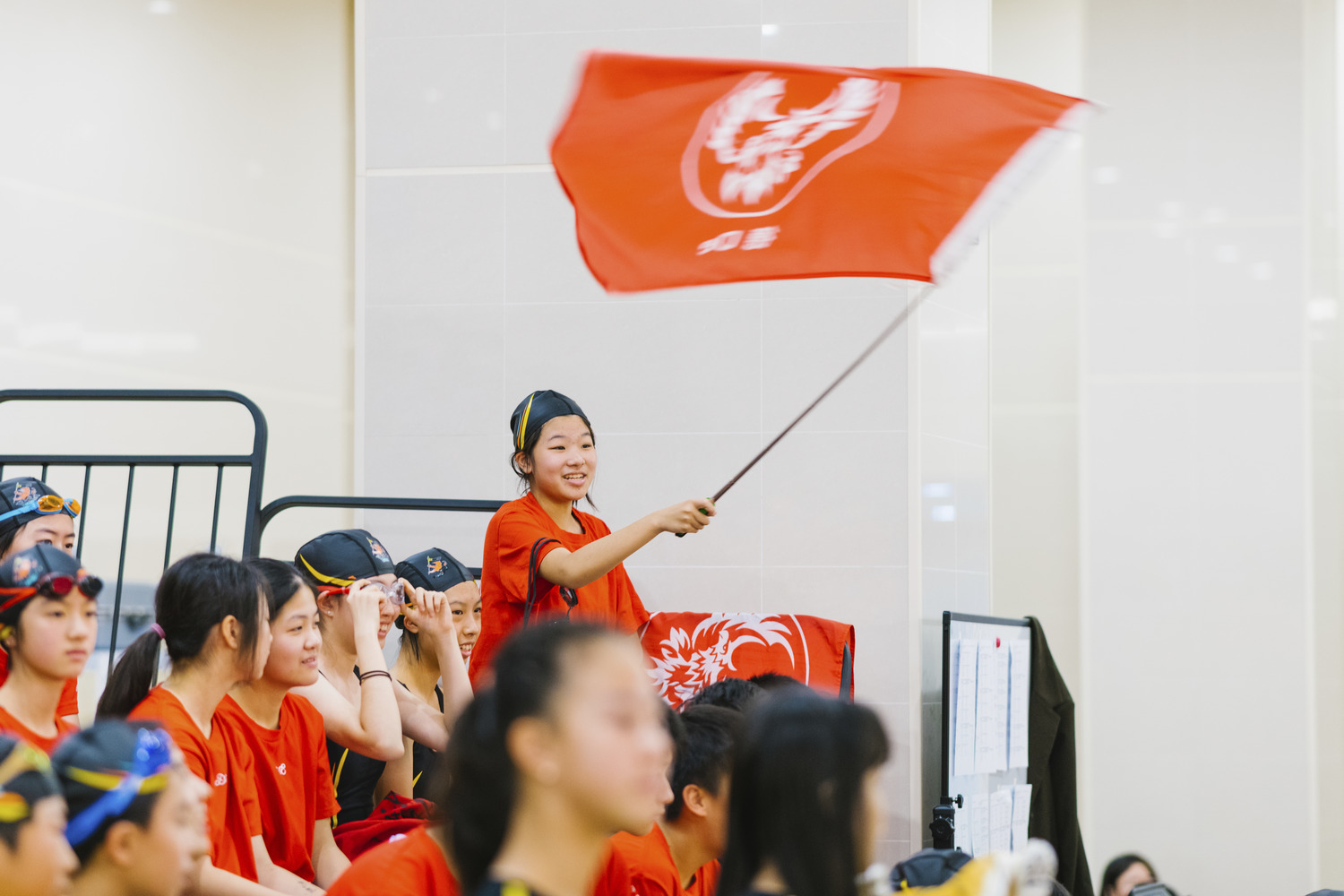
Brian Curd
Assistant Head Junior High
Leadership is a choice; it’s not a rank —— Simon Sinek
On the first day of second semester, I had the opportunity to run leadership training with House captains and sports captains in Junior High School. At the end of the session, I challenged these student leaders with the following question, “Next year, if you’re no longer a captain, would your classmates still follow you?”
This question gets to the heart of what it means to be a leader and as I watched students as they contemplated and reflected on the question, I realized that they were beginning to understand what real leadership is.

Why is it important for Hiba to create
student leadership opportunities?
Building leadership in our students will have both positive personal effects on our pupils as well as benefit our school community. For students, these opportunities allow them to learn valuable real-world skills, such as problem-solving, conflict resolution, collaboration, and communication skills. Moreover, it is the aim that Hiba students go on to be leaders in the future in both their global communities. Thus, it is important that students begin to build the skills necessary to lead others now.
Moreover, it is important that we tap into our outstanding student resources to help improve our school and its impact on the greater community. For example, many of our student leaders are currently involved in creating student-led charity initiatives as well as many other activities to benefit our students, such as the creation of an academic support website. To reach our goal of being the best bilingual school in the world, we will need the support not only of our staff and parents, but also of our student body.
What kinds of leadership opportunities
are there for students at Hiba?
This year, developing student leadership has been one of the key focal areas of our school’s development plan and this year is just the beginning of many exciting leadership initiatives that will be an integral part of student life moving forward. In Junior High School, our formal student leadership structure consists of:
House captains and deputy captains (who make up student council)
Sports captains
Arts captains
House committee leaders
Mental health champions
Youth League
For each of the opportunities above, candidates are chosen on several criteria. For example, House captains must first write an application letter detailing their reasons for applying, followed by an interview with their Housemaster, and a speech to their Housemates. Housemasters then choose candidates based on gathering opinions and data from students, House tutors, and subject teachers.
However, it is important to note that the above roles are not the only leadership opportunities for students and that in fact, most leadership opportunities are created in subject lessons and CCAs. Whether taking the lead in a History team project or Chinese debate, the role of lead attorney in Mock Trial CCA or concertmaster in the school orchestra, or captaining the Hiba football team, opportunities for students to develop leadership skills are everywhere.

Moreover, teachers at Hiba work to ensure all students are given chances to lead by differentiating the way leaders are chosen in lessons. In some cases, leaders are appointed by teachers and in others, student groups are tasked with choosing their own leader. Students who do not normally volunteer themselves for leadership are put in positions to take on the role in low stakes situations to gain experience and build their confidence.
What are the qualities of a good student leader?
When I ask students what Hiba value is most associated with leadership, the most common answer I receive is responsibility. However, despite responsibility being a very important characteristic for leaders, this trait is often more representative of managers. So this begs the questions, what the difference between a leader and a manager?
A manager is typically a person who has responsibility and accountability over outcomes in an organization, be it a company, a sports team, or a Hiba House. Normally, managers are given a formal position and oversee and direct the group’s work. Managers typically have skills such as organising, planning, and delegating tasks.

A leader, on the other hand, is a person who influences others to achieve a goal and typically has skills such as building relationships and inspiring others towards a common vision. Leaders can be managers, and often are, but being a leader does not require a formal ‘role.’ It is also important to note that not all managers are leaders.
When I asked House captains whether students would still follow them if they were not captains, I was coaching them to think about their own leadership characteristics. If captains can honestly answer ‘yes’ to this question, they have already begun to build the traits of a great student leader.
When we look at the Hiba values, responsibility is a value more connected with a great manager than a great leader. Courage and integrity are traits that inspire others by modelling behaviours we want to see in our teams and therefore, are important for a leader’s impact on others. However, these values are mostly internal, aimed at making an individual a better person with an indirect effect on people around him or her.

With this in mind, I’d contend that the Hiba values most associated with leadership are the ones least mentioned: kindness and respect. Through kindness, students build relationships with their classmates, support one another, and contribute to their communities by sacrificing their time and energy for others; they build trust and help create a sense of belonging in their group.
Through respect, students learn to accept and appreciate the perspectives of their team members and learn to listen and empathise with others. Kindness and respect are outward values aimed at directly impacting others. Therefore, I’d argue that these two values are most essential for Hiba students in developing their leadership skills.
What are the qualities of a good student leader?
In my opinion, kindness is the most essential part of a leader. A leader is not equivalent to the controller of the group, instead, he or she is the server. Whenever their teammates are in need, the leader should be the first person to help. Great leaders are kind and encouraging, and they are willing to help their team and creates positivity in the group.
– Oscar (Grade 8 Youth League Member)
A student leader should be someone that is influential and respected even when they’re not a leader.
– Nini (Grade 8 Li House Captain)
I think that a great student leader should be respectful to every student’s ideas and have the ability to carry the whole team to success with every single student in the team engaging and feeling proud of their improvements.
– Yinuo (Grade 7 Li House Sports Captain)
A great leader should have the responsibility to unite your team members and have the courage to face uncertainties, embrace challenges, accept successes and failures.
– Robert (Grade 7 Xian House Deputy Captain)
A great student leader should be supportive, inclusive, responsible, and could positively impact others.
– Sissi (Grade 8 De House Deputy Captain)
To become a great leader is about thinking for the whole first and working to make it better.
– Gloria (Grade 6 Xian House Deputy Captain)
How can a student become a leader at Hiba?
Parents often ask me, “How can my child gain leadership experience at Hiba?” This question brings me back to Simon Sinek’s quote, “Leadership is a choice, it’s not a rank.” A Hiba student can gain leadership experience every day of the year simply by supporting the school and their classmates with kindness and respect. Students simply need to take the first step as there are countless opportunities every day to do so.
Students can lead by helping their classmates understand a difficult ESS concept, giving a pat on the back to their friend who received a poor grade on their maths assessment and offering to lend support, or taking time to listen to their classmate who is having a bad day. By looking out for others and their community, students will gain the respect of their classmates who will in turn, look to them to lead.
For students who’d like to become a House captain in the future, I’d recommend the following guidance:
Demonstrate the Hiba values every day, especially kindness and respect for your classmates
Being a House captain takes leadership and management skills. A House captain needs to be responsible and be able to plan and organize tasks efficiently to create effective outcomes. A House captain also needs to role model courage and integrity to their classmates, by taking the lead on difficult tasks, accepting setbacks and failures, and choosing to do the right thing, even when it is the hard things to do.
Most importantly, House captains need to be kind and respectful to their classmates. This involves taking active steps to care for their classmates, ensure their voices are heard, and making sure their classmates are having the best possible experiences.
Proactively seek leadership opportunities in school
Students should aspire to seek out leadership opportunities in lessons, CCAs, and other school activities. It is important to remember that Housemasters seek the opinions of both students and teachers when choosing House captains, who see students’ interactions on a daily basis. Therefore, it is important for students who aspire to be House captains to role model leadership behaviours every day in lessons to gain a reputation amongst their peers and teachers as a leader.
Lead for the benefit of others, not for the benefit of yourself
When conducting a House captain interview when I was the Housemaster of De House, one student replied, 'I want to be a House captain because it will help me develop my skills and build my university application.' Another student applicant once admitted 'I applied because my mom wants me to be House captain.'
I was impressed with the honesty of these students. Moreover, these are not bad reasons to want to become a House captain. At Hiba, we look to build students’ university applications and wanting to make one's mother happy is noble. However, ultimately, these should not be the primary reasons to seek the position.
The goal of the position is first and foremost to support and improve one's house and the members in it. The role comes with some interesting opportunities but also comes with responsibility and accountability. Students must demonstrate the Hiba values at all times and must be willing to sacrifice their time and energy to support their House and Housemates.
A student applying for the role needs to consider: Do I want this for the benefit of myself or do I want this for the benefit of my House? A student who is willing to work hard for their House even when they are not a captain is the kind of student that Housemasters are looking for.

The opportunities for students to build their leadership skills are countless at Hiba and will only increase with the opening of our senior high school next year. The school has spent time to ensure these opportunities are in lessons, CCAs, House activities, as well as day-to-day interactions. For students who want to be a leader, I’d offer the following advice: The opportunities are all around you; it’s simply up to you to choose to be a leader.